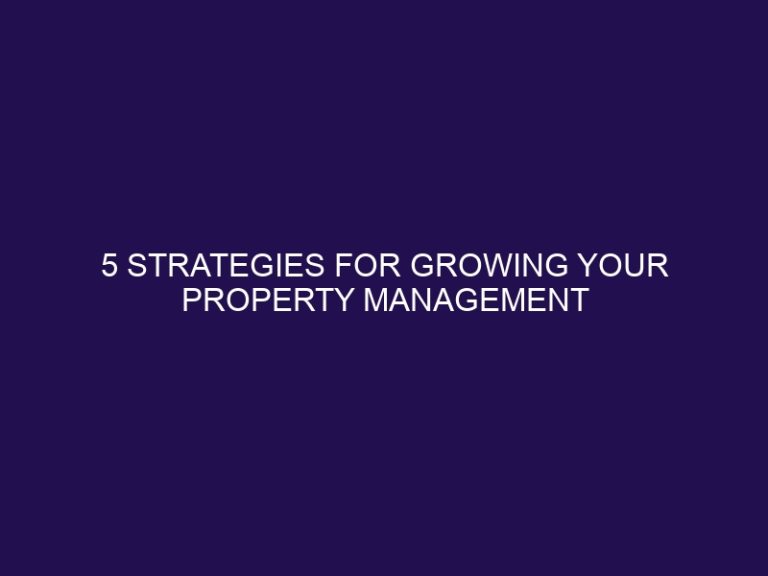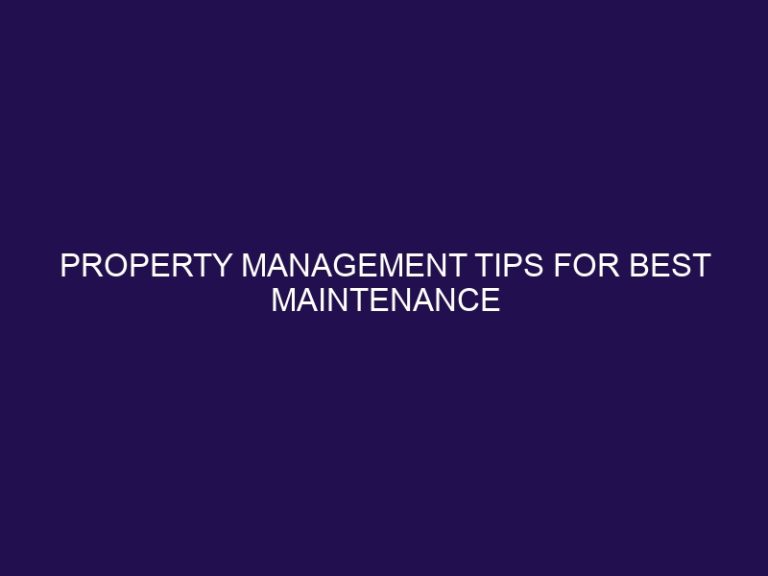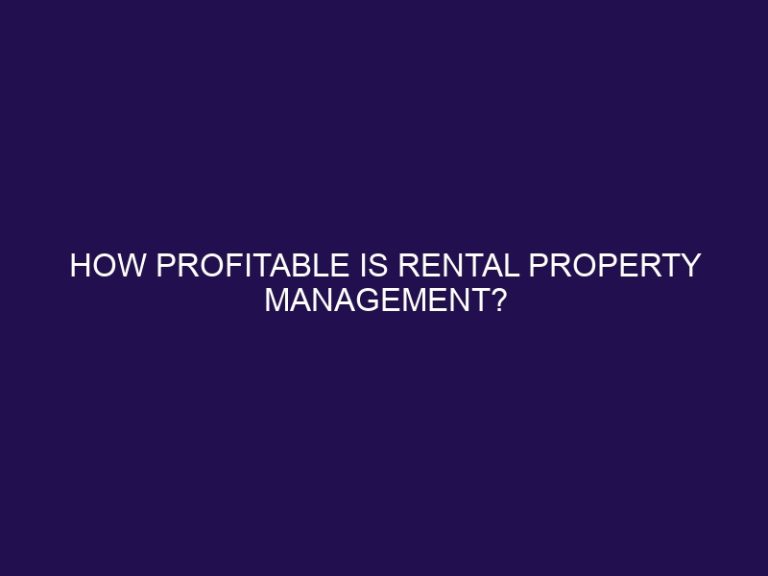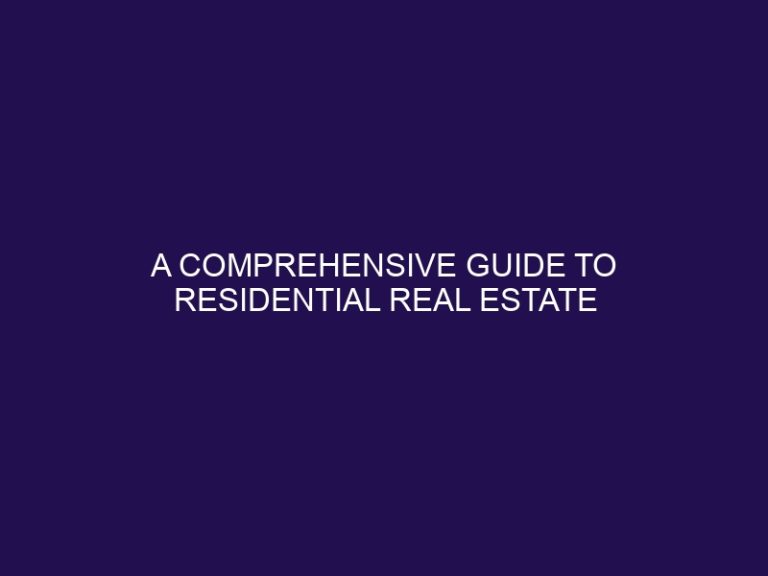How to Be a Successful Property Manager With These 10 Skills
Being a successful property manager requires a diverse set of skills to effectively handle the responsibilities and challenges that come with the role. A property manager is responsible for overseeing the operations, maintenance, and tenant relations of a property. Here are 10 key skills that are essential for anyone aspiring to be a successful property manager:
- Communication Skills: Effective communication is crucial in dealing with tenants, owners, and maintenance personnel. It involves not only conveying information clearly but also actively listening and understanding the needs and concerns of others.
- Customer Service Skills: Providing excellent customer service is vital for tenant satisfaction and retention. Property managers should be skilled in resolving tenant issues and handling complaints promptly and professionally.
- Organization and Time Management Skills: Property managers must be organized and efficient in managing tasks such as maintaining records, scheduling property maintenance, and ensuring that all necessary documentation is up to date.
- Financial Management Skills: Property managers need to have a solid understanding of budgeting, expense tracking, and financial transactions, including rent collection and handling financial records.
- Problem-Solving and Decision-Making Skills: Property managers must possess the ability to think critically and make sound decisions, especially when dealing with emergency situations or resolving tenant disputes.
- Knowledge of Property Laws and Regulations: A good property manager should be well-versed in landlord-tenant laws and regulations to ensure compliance and avoid legal issues.
- Maintenance and Property Care Skills: Property managers should have basic knowledge of property maintenance, conducting regular inspections, and hiring and managing maintenance professionals.
- Marketing and Advertising Skills: Effective marketing and advertising strategies are essential for attracting and screening potential tenants, as well as promoting and filling vacancies in a timely manner.
- Technology and Software Skills: Proficiency in property management software and managing online rental listings can greatly streamline operations and enhance efficiency.
- Leadership and Interpersonal Skills: Property managers often work with a team of staff and must be able to supervise, delegate tasks, and build positive relationships with tenants, owners, and colleagues.
By honing these essential skills, aspiring property managers can increase their chances of success in this challenging but rewarding profession.
The Role of a Property Manager
The role of a property manager is vital in guaranteeing the smooth operation and success of rental properties. As a property manager, they are responsible for a wide range of tasks including tenant screening, rent collection, maintenance coordination, and lease management. Acting as a link between the rental property owner and the tenants, a property manager handles issues and ensures tenant satisfaction. Moreover, they play a crucial role in preserving the value and profitability of the property through effective marketing and property maintenance. To succeed in the role of a property manager, one must possess exceptional communication, organizational, problem-solving, and negotiation skills. It is also essential for a property manager to stay up to date with local laws and regulations in order to ensure compliance. By being proactive, detail-oriented, and adopting a customer-centric approach, a property manager can significantly contribute to their success.
1. Communication Skills
Good communication skills are crucial to thriving as a property manager. In this section, we’ll uncover the importance of effective listening and clear, concise communication. These essential skills enable property managers to understand tenants’ needs, address concerns promptly, and ensure smooth collaboration with property owners and maintenance teams. So, buckle up and discover how honing your communication prowess can pave the way for success in the dynamic world of property management.
1.1 Effective Listening
Effective listening is a critical skill for property managers. It entails actively listening and comprehending what tenants and clients are saying in order to provide appropriate responses and solutions. By practicing effective listening, property managers can establish trust, foster productive relationships, and effectively address concerns. This skill enables property managers to gather vital information and ensure clear communication. It is crucial to attentively listen, demonstrate empathy, and ask clarifying questions as necessary. A property manager who excels in the art of effective listening can significantly enhance tenant satisfaction, promptly resolve issues, and maintain a positive reputation in the industry.
One example highlighting the significance of effective listening is when a tenant reported a water leakage. The property manager promptly listened to the tenant’s concerns, asked relevant questions, and conducted a thorough investigation. It was discovered that the leakage was caused by a plumbing issue. Accordingly, the property manager immediately contacted a licensed plumber and arranged for repairs. The tenant greatly appreciated the property manager’s attentive listening and swift action, which led to a timely resolution of the problem and increased tenant satisfaction.
1.2 Clear and Concise Communication
Clear and concise communication is a crucial skill for property managers. By effectively conveying information, property managers can ensure smooth operations and maintain positive relationships with tenants. This skill involves using simple and direct language, avoiding jargon, and being attentive to tenants’ needs. Clear and concise communication can prevent misunderstandings, reduce conflicts, and build trust between property managers and tenants. It also helps property managers to convey important information such as lease terms, repair updates, and policy changes effectively. With clear and concise communication, property managers can create a supportive and transparent environment for both tenants and property owners.
2. Customer Service Skills
Having excellent customer service skills is crucial for anyone looking to thrive as a property manager. In this section, we will explore the importance of these skills and how they can make or break your success in the field. We’ll delve into the art of resolving tenant issues and the finesse required to handle complaints effectively, ensuring tenant satisfaction and harmonious property management. So, let’s dive in and discover the key to becoming a standout property manager through exceptional customer service skills!
2.1 Resolving Tenant Issues
- Resolving tenant issues: A property manager must actively listen to tenants’ issues and concerns, empathize with their situation, and show a genuine desire to resolve their problems.
- Effective communication: Clear and concise communication is essential in addressing tenant issues. Property managers should be able to explain solutions or necessary actions in a way that tenants can easily understand.
- Timely response: Resolving tenant issues promptly is crucial. Property managers should have processes in place to address complaints or repairs in a timely manner to ensure tenant satisfaction.
- Problem-solving skills: Property managers need to be resourceful and creative in finding solutions to tenant issues. They should be able to analyze problems, identify alternatives, and implement effective solutions.
- Conflict resolution: Dealing with tenant disputes requires the ability to remain calm and neutral, mediate between parties, and find mutually agreeable resolutions.
2.2 Handling Complaints
Handling complaints is an important skill for property managers to have. Here are steps to effectively handle complaints:
Handling complaints effectively is essential for maintaining tenant satisfaction and a positive property management reputation.
True story: A property manager received a complaint about a persistent leak in the tenant’s bathroom. The manager promptly investigated the issue, coordinated repairs with a reliable plumber, and kept the tenant informed throughout the process. The leak was fixed, and the tenant appreciated the manager’s effective handling of the complaint, leading to improved tenant-manager relations.
3. Organization and Time Management Skills
Being a successful property manager requires a diverse skill set, and one crucial aspect is organization and time management. In this section, we’ll explore two key sub-sections: maintaining records and documentation, and scheduling property maintenance. Discover the essential tips, techniques, and insights that will help property managers excel in these areas, ensuring smoother operations and maximizing profitability. So, let’s dive in and learn how to master the art of organization and time management as a property manager!
3.1 Maintaining Records and Documentation
- One of the key responsibilities of property managers is to maintain accurate records and documentation, which is essential for effective management and compliance with legal requirements.
- This involves keeping track of various aspects like lease agreements, rent payments, and maintenance requests.
- Moreover, documenting communication with tenants, contractors, and vendors is also crucial.
- Property managers need to organize financial records, including income and expense statements, to ensure transparency and accountability.
- Archiving inspection reports, repair invoices, and legal documents is another important task.
- To streamline record-keeping and ensure efficiency, property managers can make use of property management software.
Pro-tip: Establishing a systematic filing system and regularly backing up digital records can prevent data loss and simplify record retrieval.
3.2 Scheduling Property Maintenance
- Create a maintenance schedule based on the property’s needs, considering regular inspections and preventive maintenance. Scheduling property maintenance is an essential task for property managers to ensure the upkeep and functionality of the property.
- Identify specific tasks that need to be performed, such as HVAC system checks, plumbing repairs, or landscaping maintenance. Scheduling property maintenance is an essential task for property managers to ensure the upkeep and functionality of the property.
- Contact reliable maintenance professionals or contractors and request quotes for the required services. Scheduling property maintenance is an essential task for property managers to ensure the upkeep and functionality of the property.
- Review the quotes and select the most suitable option based on cost, expertise, and reputation. Scheduling property maintenance is an essential task for property managers to ensure the upkeep and functionality of the property.
- Coordinate with tenants to schedule maintenance appointments, ensuring minimal disruption to their daily routines. Scheduling property maintenance is an essential task for property managers to ensure the upkeep and functionality of the property.
- Provide clear instructions and guidelines to the maintenance professionals regarding the tasks to be completed. Scheduling property maintenance is an essential task for property managers to ensure the upkeep and functionality of the property.
- Follow up with the maintenance professionals to ensure that the work is completed satisfactorily and within the agreed timeframe. Scheduling property maintenance is an essential task for property managers to ensure the upkeep and functionality of the property.
- Keep records of all maintenance activities, including dates, tasks performed, and costs incurred. Scheduling property maintenance is an essential task for property managers to ensure the upkeep and functionality of the property.
- Regularly evaluate the effectiveness of the maintenance schedule and make adjustments as necessary to improve efficiency. Scheduling property maintenance is an essential task for property managers to ensure the upkeep and functionality of the property.
4. Financial Management Skills
When it comes to being a successful property manager, financial management skills are paramount. In this section, we’ll dive into the world of numbers and dollars, exploring the essential skills needed to effectively manage property finances. From budgeting and expense tracking to collecting rent and handling financial transactions, we’ll uncover the key practices that will keep your property management game strong. So grab your calculator and get ready to master the financial side of property management like a pro!
4.1 Budgeting and Expense Tracking
Budgeting and expense tracking are crucial skills for property managers. These skills are essential to ensure that property expenses are planned and accounted for, thereby helping to maintain financial stability. Effective expense tracking involves keeping accurate records of all property-related costs, allowing property managers to monitor spending and make informed decisions. To excel in these skills, property managers should:
- Create a detailed budget that includes all anticipated expenses for the property.
- Regularly review and update the budget to ensure accuracy.
- Track expenses carefully by maintaining organized records.
- Analyze spending patterns to identify areas for cost-saving or optimization.
- Utilize specialized software or tools to streamline the budgeting and expense tracking process.
FACT: A study found that property managers who actively practice budgeting and track expenses experience an average cost reduction of 10% compared to those who do not prioritize these tasks.
4.2 Collecting Rent and Handling Financial Transactions
- Establish a clear and consistent rent collection process, including setting due dates and providing multiple payment options.
- Send regular reminders to tenants regarding rent payments and provide clear instructions on how to make payments.
- Create and maintain accurate financial records, tracking rent payments and ensuring all transactions are properly recorded.
- Handle late payments and delinquencies promptly, following legal procedures if necessary.
- Communicate effectively with tenants about any financial issues or concerns, providing transparent and timely updates.
- Implement a system for tracking and reconciling rent payments, ensuring accurate accounting and record-keeping.
- Collaborate with accountants or financial professionals to manage complex financial transactions and reporting.
- Stay up-to-date on relevant laws and regulations related to rent collection and financial transactions.
- Utilize technology and software to streamline and automate rent collection processes, improving efficiency and accuracy.
- Provide exceptional customer service when handling financial transactions, addressing any inquiries or concerns promptly and professionally.
5. Problem-Solving and Decision-Making Skills
When it comes to being a successful property manager, problem-solving and decision-making skills are key. In this section, we’ll dive into two essential aspects: handling emergency situations and resolving tenant disputes. From navigating unexpected crises to fostering positive relationships with tenants, we’ll explore the strategies and skills needed to effectively tackle these challenges head-on. So, let’s get ready to equip ourselves with the tools to excel in property management!
5.1 Handling Emergency Situations
- Handling emergency situations is a crucial skill for property managers. They need to be prepared to respond quickly and efficiently in times of crisis. Here are some steps that property managers should take when faced with an emergency:
- Stay calm and assess the situation.
- Contact appropriate authorities, such as fire or police departments, if necessary.
- Ensure the safety of tenants and staff by evacuating the building if required.
- Communicate with tenants, providing clear instructions and updates as needed.
- Document the incident and any damages for insurance purposes.
- Coordinate with maintenance professionals to address immediate repairs and ensure the property is safe for re-entry.
- Assist tenants in finding temporary accommodations, if necessary.
- Implement preventive measures to avoid similar emergencies in the future.
- Follow up with tenants to address any concerns or questions they may have.
- Review and update emergency response plans regularly to improve preparedness.
5.2 Resolving Tenant Disputes
To effectively resolve tenant disputes, property managers should follow a step-by-step process:
- Listen to both parties to understand their concerns and perspective.
- Review the lease agreement to identify relevant clauses or policies.
- Research local tenant laws to ensure compliance.
- Mediate between the tenants to find a mutually agreeable solution.
- If a resolution cannot be reached, involve a neutral third party or mediator.
- Document all discussions and actions taken during the dispute resolution process.
- Communicate the final decision to the tenants in writing.
- Follow up to ensure compliance with the agreed-upon solution.
By following these steps, property managers can effectively and efficiently resolve tenant disputes while maintaining a positive landlord-tenant relationship.
6. Knowledge of Property Laws and Regulations
As a property manager, staying on top of property laws and regulations is key to your success. In this section, we’ll dive into the importance of having knowledge in this area and explore two essential sub-topics: Understanding Landlord-Tenant Laws and Compliance with Fair Housing Regulations. Get ready to gain valuable insights and tips to ensure you navigate the legal landscape of property management with confidence and ease. Say goodbye to uncertainty and hello to mastery of property laws!
6.1 Understanding Landlord-Tenant Laws
Understanding landlord-tenant laws is a crucial skill for property managers. It is essential for property managers to have a thorough understanding of landlord-tenant laws in order to effectively navigate the complexities of renting properties and safeguard the interests of all parties involved. This involves being familiar with local, state, and federal regulations to ensure compliance, protect the rights of both landlords and tenants, and ultimately promote a fair and harmonious relationship between landlords and tenants.
Key aspects to understand include lease agreements, eviction processes, security deposit handling, and fair housing requirements. It is important for property managers to stay up to date with changes in legislation in order to avoid legal disputes and potential financial penalties. To deepen their knowledge, successful property managers prioritize ongoing education and may seek professional certifications. Additionally, collaborating with legal professionals can provide guidance and ensure legal compliance.
6.2 Compliance with Fair Housing Regulations
Compliance with fair housing regulations is a critical skill that property managers must possess. It entails comprehending and adhering to laws that bar housing discrimination based on various factors like race, color, religion, sex, disability, and familial status. Property managers need to ensure that all rental application procedures, tenant screening, lease agreements, and property maintenance are carried out in an impartial and unbiased manner. By upholding these fair housing regulations, property managers establish an environment of inclusivity and equality for all tenants. A relevant illustration is a case in Ohio where a property manager faced legal action for violating fair housing regulations due to their refusal to rent to African-American applicants. This particular instance underlines the significance of complying with fair housing laws to avoid legal repercussions and foster housing equality.
7. Maintenance and Property Care Skills
To truly excel as a property manager, mastering the realm of maintenance and property care is absolutely crucial. This section will equip you with the essential skills needed to keep your properties in top-notch condition. We’ll explore the art of conducting regular property inspections and maintenance, ensuring that no issue goes unnoticed. We’ll delve into the intricacies of hiring and effectively managing maintenance professionals, so you can confidently build a reliable team to tackle any property-related challenge that comes your way. Let’s dive in!
7.1 Regular Property Inspections and Maintenance
- Regular Property Inspections and Maintenance: It is crucial to perform regular property inspections and maintenance to ensure the upkeep and longevity of the property.
- Develop an inspection checklist: Create a checklist to cover all areas of the property during inspections.
- Inspect the property regularly: Make sure to inspect the property at least once every quarter to identify any maintenance issues.
- Check for signs of damage: Look for any indications of damage such as leaks, cracks, or wear and tear.
- Maintain safety equipment: Ensure that safety equipment like fire extinguishers and smoke detectors are in good working condition.
- Schedule regular maintenance tasks: Set up a schedule for routine maintenance tasks such as cleaning gutters, servicing HVAC systems, and inspecting plumbing and electrical systems.
- Keep detailed records: Maintain comprehensive records of all inspections and maintenance tasks conducted.
- Promptly address issues: Take immediate action to fix any identified issues by either doing it yourself or hiring professionals.
- Communicate with tenants: Keep tenants informed about the purpose and schedule of inspections to minimize disruptions.
7.2 Hiring and Managing Maintenance Professionals
When it comes to hiring and managing maintenance professionals as a property manager, the first step is to identify the maintenance needs of the property and create a detailed job description for the role. Once this is done, the next step is to advertise the job opening through various channels, such as online job boards and local classifieds.
The screening and interviewing process is crucial in finding competent candidates. During this process, it is important to assess their experience, qualifications, and skills in maintenance work. Additionally, references should be checked and background checks should be conducted to ensure the reliability and trustworthiness of the candidates.
Once a suitable candidate is selected, the terms of employment, including salary, benefits, and work schedule, can be negotiated. After hiring, it is essential to provide proper training and orientation to the newly hired maintenance professional. This will help familiarize them with the property and its specific maintenance requirements.
To ensure effective communication, clear and efficient channels should be established for reporting maintenance issues and scheduling repairs. Regular evaluation of the maintenance professional’s performance is important, as it allows for necessary feedback and support for their ongoing development.
Managing maintenance requests and tracking the completion of repairs can be simplified by implementing a systematic approach. By creating a system for this purpose, it becomes easier to keep track of all requests and ensure timely completion of repairs.
Maintaining good working relationships with the maintenance professional is crucial. Any issues or conflicts that may arise should be addressed promptly and professionally to maintain a productive working environment.
By following these steps, hiring and managing maintenance professionals can be done successfully.
8. Marketing and Advertising Skills
When it comes to being a successful property manager, one skill that stands out is marketing and advertising. In this section, we’ll explore how mastering the art of attracting and screening tenants can take your property management game to the next level. Plus, we’ll dive into the importance of effectively advertising your vacancies to ensure a steady stream of potential renters. Get ready to discover the secrets that will make your properties shine in the competitive market!
8.1 Attracting and Screening Tenants
- Effective marketing strategies: Develop targeted advertising campaigns to attract potential tenants through various channels, such as online rental listings, social media, and local publications to attract and screen tenants effectively.
- Thorough tenant screening: Implement a comprehensive screening process to ensure reliable and responsible tenants. This may include conducting background checks, verifying employment and income, and checking rental history to attract and screen tenants effectively.
- Clear tenant criteria: Establish specific criteria for prospective tenants, including credit score requirements, income-to-rent ratio, and rental history guidelines to attract and screen tenants effectively.
- Professional property showings: Conduct well-organized and informative property showings to showcase the property’s features and answer any questions potential tenants may have to attract and screen tenants effectively.
- Responsive communication: Maintain open lines of communication with interested tenants, promptly responding to inquiries and providing clear and accurate information to attract and screen tenants effectively.
A property manager diligently advertised a vacant apartment using online platforms and local listings. They carefully screened several applicants, checking their backgrounds and rental histories. They selected a responsible and reliable tenant who paid rent on time and took good care of the property. The property manager’s thorough tenant screening and effective marketing strategies resulted in finding a great tenant for the apartment.
8.2 Advertising Vacancies
To effectively advertise vacancies as a property manager, it is important to utilize various marketing strategies and platforms to attract potential tenants. Here are some key tactics to consider:
-
Create compelling rental listings that highlight the unique features and benefits of the property.
-
Use high-quality and visually appealing photographs to showcase the property’s interior and exterior.
-
Write clear and detailed property descriptions that emphasize key selling points and amenities.
-
Utilize online listing platforms such as real estate websites and social media to reach a wider audience.
-
Optimize your listings with relevant keywords and search engine optimization techniques to increase visibility.
-
Consider paid advertising options such as Google Ads or social media ads to target specific demographics and increase exposure.
-
Utilize traditional marketing methods like signage, flyers, and newspaper ads to reach local audiences.
-
Engage with potential tenants through prompt responses to inquiries, providing additional information, and scheduling property viewings.
-
Regularly update and refresh your listings to ensure they remain current and appealing to potential tenants.
-
Track and analyze the effectiveness of your advertising efforts to identify areas of improvement and adjust your strategy accordingly.
-
Effectively advertise vacancies as a property manager is crucial to attract potential tenants. To achieve this, one must utilize various marketing strategies and platforms to maximize exposure. Below are essential tactics to consider when advertising vacancies:
1. Create engaging rental listings that highlight the unique features and benefits of the property.
2. Utilize visually appealing, high-quality photographs to showcase the property’s interior and exterior.
3. Compose clear and detailed property descriptions that emphasize key selling points and amenities.
4. Make use of online listing platforms like real estate websites and social media to reach a wider audience.
5. Optimize your listings by incorporating relevant keywords and employing search engine optimization techniques for increased visibility.
6. Consider paid advertising options, such as Google Ads or social media ads, to target specific demographics and boost exposure.
7. Alongside digital strategies, traditional marketing methods like signage, flyers, and newspaper ads should be employed to reach local audiences.
8. Engage with potential tenants by promptly responding to inquiries, providing additional information, and scheduling property viewings.
9. Regularly update and refresh your listings to ensure they remain current and attractive to potential tenants.
10. Track and analyze the effectiveness of your advertising efforts to identify areas of improvement and fine-tune your strategy accordingly.
9. Technology and Software Skills
In the world of property management, technology and software skills are essential for success. In this section, we’ll explore the power of leveraging property management software and the art of effectively managing online rental listings. Get ready to discover how these technological tools can revolutionize your property management game, increase efficiency, and attract the right tenants. Say goodbye to manual processes and hello to a new era of streamlined property management!
9.1 Utilizing Property Management Software
Property managers can enhance their efficiency and effectiveness by utilizing property management software. By incorporating property management software, property managers can leverage a range of features to streamline tasks and increase productivity. These tools offer numerous benefits, including automated rent collection, maintenance management, financial tracking, tenant communication, and documentation and record keeping.
With property management software, property managers can enable online rent payments and automatic reminders, effectively minimizing late payments and reducing administrative work. Additionally, the software enables property managers to schedule and track maintenance requests, ensuring timely resolutions and improving tenant satisfaction.
Financial tracking becomes effortless with the use of software, as property managers can easily track income and expenses, generate financial reports, and streamline budgeting processes. Additionally, property management software provides communication tools for property managers to send announcements, reminders, and updates to tenants, thereby enhancing overall communication and reducing misunderstandings.
Furthermore, property management software allows managers to store and manage lease documents, tenant information, and other important records in a centralized location, improving accessibility and organization.
To effectively utilize property management software, property managers should thoroughly research and choose a platform that aligns with their specific needs and business goals. Moreover, training and support from the software provider can ensure a smooth transition and maximize the benefits of using the software.
9.2 Managing Online Rental Listings
- Managing online rental listings is crucial for property managers to attract potential tenants and ensure a smooth rental process. This includes creating compelling property descriptions with accurate information about the rental unit’s features, amenities, and location.
- It is important to include high-quality photos of the property, showcasing its best features and creating an appealing visual presentation.
- Strategic keywords and optimized titles should be utilized to improve the visibility of the listing in online search results.
- Regularly updating and maintaining the listing is key to reflecting the current availability, pricing, and any changes in property details.
- Promptly responding to inquiries and scheduling property viewings for interested applicants is essential.
- Online platforms and property management software can be used to track leads, manage applications, and communicate with potential tenants.
- Monitoring and analyzing the performance of the listing is necessary to identify areas for improvement and adjust marketing strategies accordingly.
- Staying updated on current market trends and rental rates in the area ensures competitive pricing and attracts quality tenants.
- Engaging with online rental listing platforms and promoting the property through additional marketing channels helps reach a wider audience.
10. Leadership and Interpersonal Skills
To be a successful property manager, having strong leadership and interpersonal skills is paramount. In this section, we will explore the importance of these skills and how they contribute to effective property management. From supervising staff and delegating tasks, to building positive relationships with tenants, each sub-section will provide invaluable insights on enhancing your abilities as a property manager. Get ready to dive into the world of leadership and interpersonal skills, where success in property management awaits!
10.1 Supervising Staff and Delegating Tasks
Supervising Staff and Delegating Tasks is an essential skill for property managers. To excel in this area, follow these steps:
- Clearly define roles and responsibilities for each staff member.
- Communicate expectations and provide necessary training.
- Implement a system for regular check-ins and feedback.
- Delegate tasks based on individual strengths and workload.
- Set deadlines and monitor progress to ensure timely completion.
- Foster a positive and collaborative work environment.
- Offer support and resources to help staff succeed.
- Address any issues or conflicts promptly and professionally.
- Recognize and reward exceptional performance.
- Continuously evaluate and adjust the delegation process as needed.
In an exemplary case, a property manager in a condominium complex successfully supervised a team of maintenance staff and effectively delegated tasks. By clearly defining roles and providing proper training, the manager ensured efficient handling of routine maintenance and repairs. This resulted in improved tenant satisfaction and increased property value. The manager maintained regular communication with the staff, motivating them and addressing any concerns. Through their effective supervision and delegation, the property manager created a harmonious work environment and achieved outstanding results.
10.2 Building Positive Relationships with Tenants
Building positive relationships with tenants is crucial for a successful property manager. Here are some steps to foster those relationships:
- Regular Communication: Proactively reach out to tenants for updates or to address any concerns.
- Responsive Maintenance: Prioritize and promptly address maintenance issues to ensure tenant satisfaction.
- Be Professional and Respectful: Treat tenants respectfully and professionally, addressing their needs and concerns with empathy.
- Build Trust: Be transparent, reliable, and fulfill promises to build trust with tenants.
- Address Conflict: Handle conflicts and disputes professionally, mediating and finding fair resolutions.
- Rewards and Incentives: Consider offering rewards or incentives for tenants who consistently adhere to lease agreements or maintain the property well.
10.2 Building Positive Relationships with Tenants
Frequently Asked Questions
What are the key skills a property manager needs to be successful in a competitive industry?
In a competitive industry, property managers need to have excellent communication skills to effectively communicate with clients, tenants, and members of their team. They also need strong organizational processes to ensure all tasks are completed efficiently and nothing falls through the cracks. Additionally, a good property manager should have a thorough understanding of landlord-tenant laws to handle legal matters confidently.
How can a property management company stand out from the competition?
To stand out from the competition, a property management company needs to prioritize excellent communication and customer service orientation. By providing clear and timely communication with clients and tenants, addressing concerns promptly, and satisfying customer needs, the company can build a strong reputation and attract more clients.
How important is it for a property manager to have strong organization skills?
Organization skills are crucial for a property manager to handle multiple tasks simultaneously and ensure nothing gets overlooked. With effective organizational processes in place, a property manager can minimize missed tasks, avoid lost income due to vacancies, and provide consistent service to clients and tenants.
What role does property marketing play in the success of a property manager?
Property marketing is essential for attracting quality tenants and minimizing vacancies. A property manager should have knowledge of the target market and utilize various marketing strategies, such as professional photos, compelling property descriptions, and advertising on online platforms, to reach potential tenants and maximize property occupancy.
How does knowledge of landlord-tenant laws contribute to the success of a property manager?
Understanding landlord-tenant laws is crucial for a property manager to handle legal matters appropriately, such as setting rental rates, handling lease agreements, and managing tenant disputes. By having a solid grasp of these laws, a property manager can avoid legal issues and maintain a positive relationship with both property owners and tenants.
What are the consequences of unclear communication in property management?
Unclear communication can lead to misunderstandings, delays, and unhappy clients. It can result in missed tasks, delayed repair and maintenance work, and even legal complications. By ensuring a clear communication chain within the property management team and with clients and tenants, a property manager can build trust and provide efficient services.




![How to start a property management company the right way [Canada]](https://rentincrease.ca/wp-content/uploads/2023/10/how-to-start-a-property-management-company-the-right-way-canada_2665-768x576.jpg)


